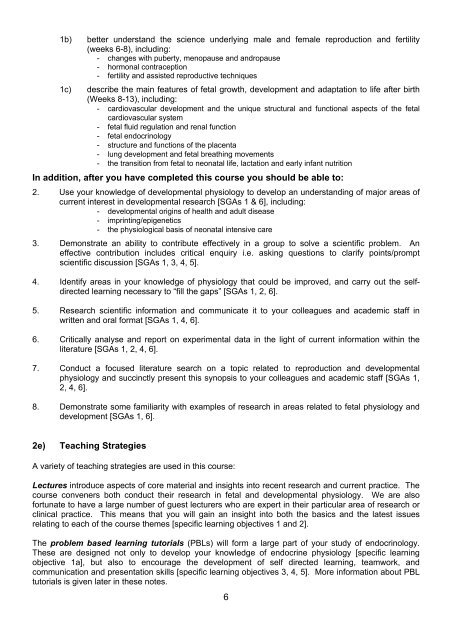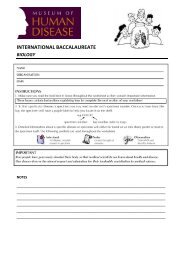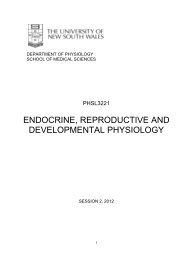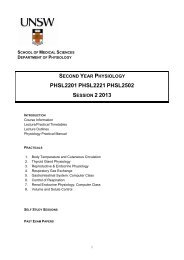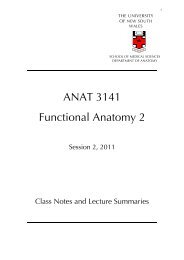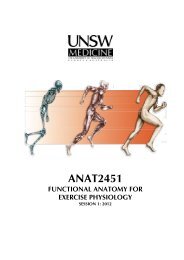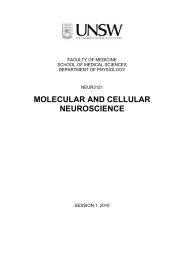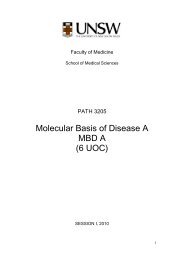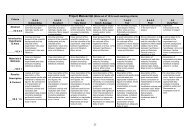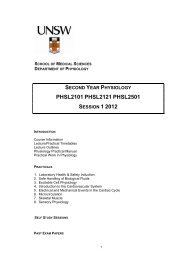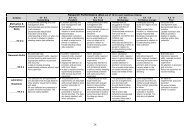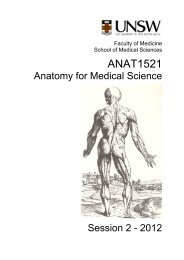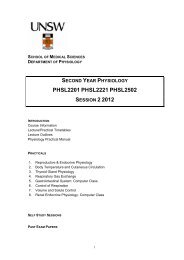endocrine, reproductive and developmental physiology - School of ...
endocrine, reproductive and developmental physiology - School of ...
endocrine, reproductive and developmental physiology - School of ...
Create successful ePaper yourself
Turn your PDF publications into a flip-book with our unique Google optimized e-Paper software.
1b) better underst<strong>and</strong> the science underlying male <strong>and</strong> female reproduction <strong>and</strong> fertility<br />
(weeks 6-8), including:<br />
- changes with puberty, menopause <strong>and</strong> <strong>and</strong>ropause<br />
- hormonal contraception<br />
- fertility <strong>and</strong> assisted <strong>reproductive</strong> techniques<br />
1c) describe the main features <strong>of</strong> fetal growth, development <strong>and</strong> adaptation to life after birth<br />
(Weeks 8-13), including:<br />
- cardiovascular development <strong>and</strong> the unique structural <strong>and</strong> functional aspects <strong>of</strong> the fetal<br />
cardiovascular system<br />
- fetal fluid regulation <strong>and</strong> renal function<br />
- fetal endocrinology<br />
- structure <strong>and</strong> functions <strong>of</strong> the placenta<br />
- lung development <strong>and</strong> fetal breathing movements<br />
- the transition from fetal to neonatal life, lactation <strong>and</strong> early infant nutrition<br />
In addition, after you have completed this course you should be able to:<br />
2. Use your knowledge <strong>of</strong> <strong>developmental</strong> <strong>physiology</strong> to develop an underst<strong>and</strong>ing <strong>of</strong> major areas <strong>of</strong><br />
current interest in <strong>developmental</strong> research [SGAs 1 & 6], including:<br />
- <strong>developmental</strong> origins <strong>of</strong> health <strong>and</strong> adult disease<br />
- imprinting/epigenetics<br />
- the physiological basis <strong>of</strong> neonatal intensive care<br />
3. Demonstrate an ability to contribute effectively in a group to solve a scientific problem. An<br />
effective contribution includes critical enquiry i.e. asking questions to clarify points/prompt<br />
scientific discussion [SGAs 1, 3, 4, 5].<br />
4. Identify areas in your knowledge <strong>of</strong> <strong>physiology</strong> that could be improved, <strong>and</strong> carry out the selfdirected<br />
learning necessary to “fill the gaps” [SGAs 1, 2, 6].<br />
5. Research scientific information <strong>and</strong> communicate it to your colleagues <strong>and</strong> academic staff in<br />
written <strong>and</strong> oral format [SGAs 1, 4, 6].<br />
6. Critically analyse <strong>and</strong> report on experimental data in the light <strong>of</strong> current information within the<br />
literature [SGAs 1, 2, 4, 6].<br />
7. Conduct a focused literature search on a topic related to reproduction <strong>and</strong> <strong>developmental</strong><br />
<strong>physiology</strong> <strong>and</strong> succinctly present this synopsis to your colleagues <strong>and</strong> academic staff [SGAs 1,<br />
2, 4, 6].<br />
8. Demonstrate some familiarity with examples <strong>of</strong> research in areas related to fetal <strong>physiology</strong> <strong>and</strong><br />
development [SGAs 1, 6].<br />
2e) Teaching Strategies<br />
A variety <strong>of</strong> teaching strategies are used in this course:<br />
Lectures introduce aspects <strong>of</strong> core material <strong>and</strong> insights into recent research <strong>and</strong> current practice. The<br />
course conveners both conduct their research in fetal <strong>and</strong> <strong>developmental</strong> <strong>physiology</strong>. We are also<br />
fortunate to have a large number <strong>of</strong> guest lecturers who are expert in their particular area <strong>of</strong> research or<br />
clinical practice. This means that you will gain an insight into both the basics <strong>and</strong> the latest issues<br />
relating to each <strong>of</strong> the course themes [specific learning objectives 1 <strong>and</strong> 2].<br />
The problem based learning tutorials (PBLs) will form a large part <strong>of</strong> your study <strong>of</strong> endocrinology.<br />
These are designed not only to develop your knowledge <strong>of</strong> <strong>endocrine</strong> <strong>physiology</strong> [specific learning<br />
objective 1a], but also to encourage the development <strong>of</strong> self directed learning, teamwork, <strong>and</strong><br />
communication <strong>and</strong> presentation skills [specific learning objectives 3, 4, 5]. More information about PBL<br />
tutorials is given later in these notes.<br />
6


